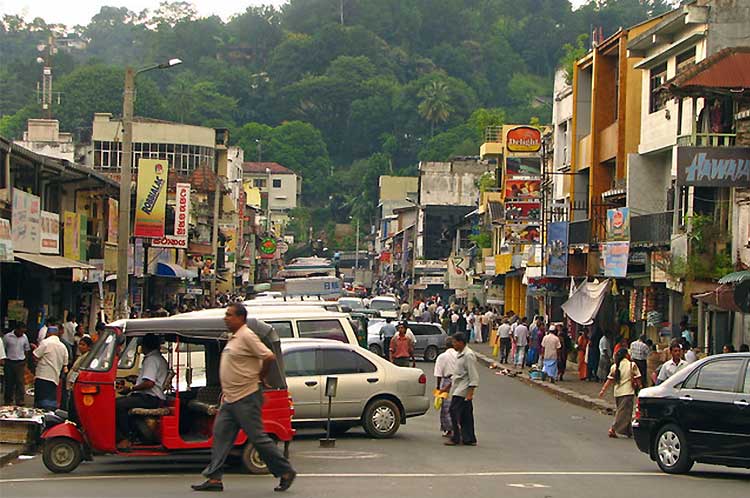May 14, 2019 Reading Time: 5 minutes
 Reading Time: 5 min read
Reading Time: 5 min readImage Credits: McKay Savage/flickr
*Ganeshan Wignaraja
Over 250 people died1 in last month’s IS-linked2 Easter bombings in Sri Lanka, making it one of the worst terror attacks since 9/11.3 Major incidents such as this cause extreme disruption in fragile countries like Sri Lanka, which is already grappling with the legacies of a thirty-year civil conflict, a simmering debt crisis, weak economic growth, and a fractured, unequal society.
To deal with the negative fallout, Sri Lanka must respond with a mix of security, governance and development policy actions, offering lessons for other lower-income, fragile countries.
Five policy lessons following the attacks in Sri Lanka:
Since 9/11, the likelihood of terror attacks that cause significant disruption to the economy, politics and society of fragile countries like Sri Lanka has greatly increased. To manage to this threat, fragile countries need a comprehensive national response that involves an integrated set of security, governance and development policies.
1Ministry of Health, Nutrition & Indigenous Medicine. (2019). Press Release – Director General of Health Services. [online] Available at: http://www.health.gov.lk/moh_final/english/index.php [Accessed 09 May 2019].
2The Guardian. (2019). Sri Lanka bombings: Islamic State claims responsibility for attacks. [online] Available at: https://www.theguardian.com/world/2019/apr/23/sri-lanka-bombings-first-burials-take-place-on-day-of-mourning [Accessed 09 May 2019].
3The Guardian. (2019). Sri Lanka terrorist attacks among world’s worst since 9/11. [online] Available at: https://www.theguardian.com/world/2019/apr/22/sri-lanka-terrorist-attacks-among-worst-world-911 [Accessed 10 May 2019].
4The New York Times. (2019). Sri Lanka Attacks: What We Know and Don’t Know. [online] Available at: https://www.nytimes.com/2019/04/24/world/asia/sri-lanka-easter-bombing-attacks.html [Accessed 09 May 2019].
5The Diplomat. (2019). Sri Lanka’s Perfect Storm of Failure. [online] Available at: https://foreignpolicy.com/2019/04/23/sri-lankas-perfect-storm-of-failure-bombings-government-mistakes-terrorism/ [Accessed 09 May 2019].
6Ada Derana. (2019). Island-wide police curfew declared. [online] Available at: http://www.adaderana.lk/news.php?nid=54500 [Accessed 09 May 2019].
7Ada Derana. (2019). Social media temporarily blocked. [online] Available at: http://www.adaderana.lk/news.php?nid=54502 [Accessed 09 May 2019].
8Newsfirst. (2019). Usage of Drones Banned Until Further Notice. [online]. Available at: https://www.newsfirst.lk/2019/05/14/usage-of-drones-banned-until-further-notice/ [Accessed 14 May 2019].
9CNN. (2019). The latest on Sri Lanka’s Bombing investigation. [online] Available at: https://edition.cnn.com/asia/live-news/sri-lanka-bombings-latest-day-4-intl-dle/index.html [Accessed 09 May 2019].
10News First. (2019). UK to support setting up body to analyze terrorism threats. [online] Available at: https://www.newsfirst.lk/2019/05/03/uk-to-support-setting-up-body-to-analyze-terrorism-threats/ [Accessed 09 May 2019].
11Sunday Times. (2019). President appoints three-member committee headed by former SC judge Vijith Malalgoda to probe Easter Sunday attacks. [online] Available at: http://www.sundaytimes.lk/article/1084990/president-appoints-three-member-committee-to-probe-easter-sunday-attacks [Accessed 09 May 2019].
12Ministry of Foreign Affairs of Sri Lanka. (2019). Update on Foreign National Casualties at Explosions in Sri Lanka – 06 May 2019. [online] Available at: https://www.mfa.gov.lk/update_06-may-2019/ [Accessed 09 May 2019].
13Daily News. (2019). Countries tighten travel advisories to Sri Lanka. [online] Available at: http://www.dailynews.lk/2019/04/29/local/184096/countries-tighten-travel-advisories-sri-lanka [Accessed 09 May 2019].
14Daily Mirror. (2019). Govt. assessing damage to economy: Mangala. [online] Available at: http://www.dailymirror.lk/breaking_news/Govt–assessing-damage-to-economy:-Mangala/108-166066 [Accessed 09 May 2019].
15Economy Next. (2019). Thousands of tourists cut short visits to Sri Lanka, new bookings fall. [online] Available at: https://economynext.com/Thousands_of_tourists_cut_short_visits_to_Sri_Lanka,_new_bookings_fall-3-14144-7.html [Accessed 09 May 2019].
16Economy Next. (2019). Sri Lanka announces debt moratorium, subsidized credit for tourism. [online] Available at: https://economynext.com/Sri_Lanka_announces_debt_moratorium,_subsidized_credit_for_tourism-3-14335.html [Accessed 09 May 2019].
17Daily News. (2019). Relief package to strengthen tourism sector. [online] Available at: http://www.dailynews.lk/2019/05/08/finance/184959/relief-package-strengthen-tourism-sector [Accessed 09 May 2019].
18Department of Census and Statistics. (2017). Sri Lanka Labour Force Survey Annual Report-2017. [online] Available at: http://www.statistics.gov.lk/samplesurvey/LFS_Annual%20Report_2017.pdf [Accessed 09 May 2019]
*Dr. Ganeshan Wignaraja is the Executive Director of the Lakshman Kadirgamar Institute of International Relations and Strategic Studies (LKI). The opinions expressed in this piece are the author’s own and not the institutional views of LKI, and do not necessarily reflect the position of any other institution or individual with which the author is affiliated. This article was originally published by the Overseas Development Institute (ODI), London.